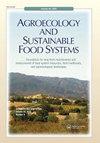荷兰农民变化轨迹的“内在”维度:持续农业生态实践的驱动因素、触发因素和转折点
IF 2.6
3区 农林科学
Q1 AGRICULTURE, MULTIDISCIPLINARY
引用次数: 1
摘要
荷兰越来越需要向可持续农业转型。农业生态学被公认为传统农业方法的一种可持续的、潜在的变革性替代品。然而,很少有农民采用农业生态做法。最近的文献表明,未能实现持续和转型的变革可能是由于忽视了这些过程的个人非物质方面,也被称为可持续性的“内部”维度。为了获得经验基础,探索了九位农业生态农民的个人转型路径,并使用“摩擦和牵引区”的概念框架分析了三个相互关联和嵌入的转型领域的变化过程:个人、实践和政治。选择的框架可以看到转型中个人方面的作用,而不会忽视来自“外部”的压力和影响。摩擦和牵引区的识别揭示了转型发生的地点和原因,以及农民对农业生态的选择和热情背后的驱动力。我们认为,关注“内在”维度或个人领域是现实和政治领域(即外部世界)持续变革的基础。所提出的研究结果对旨在向可持续粮食系统过渡的战略具有启示意义。本文章由计算机程序翻译,如有差异,请以英文原文为准。
The ‘inner’ dimension of Dutch farmers’ trajectories of change: drivers, triggers and turning points for sustained agroecological practices
ABSTRACT Transformation to sustainable agriculture in the Netherlands is increasingly called for. Agroecology is acknowledged as a sustainable – potentially transformative – alternative for conventional methods of agriculture. However, few farmers adopt agroecological practices. Recent literature suggests failure to achieve sustained and transformational change may be due to neglectance of personal, nonmaterial aspects of such processes, also referred to as “inner” dimensions of sustainability. Aiming for empirical underpinning, individual transition pathways of nine agroecological farmers were explored, and processes of change were analyzed using a conceptual framework of “zones of friction and traction” across three interconnected and embedded spheres of transformation: the personal, the practical and the political. The chosen framework allows for seeing the role of the personal aspects of transformation, without losing sight of pressures and influences from the “outside.” Identification of zones of friction and traction revealed where and why transformation was happening, as well as the drivers behind farmers’ choice and passion for agroecology. We argue that focus on the “inner” dimension or personal sphere is foundational to sustained transformational change in the practical and political spheres, i.e. the outside world. The presented findings have implications for strategies targeting envisioned transition toward a sustainable food system.
求助全文
通过发布文献求助,成功后即可免费获取论文全文。
去求助
来源期刊

Agroecology and Sustainable Food Systems
AGRICULTURE, MULTIDISCIPLINARY-GREEN & SUSTAINABLE SCIENCE & TECHNOLOGY
CiteScore
4.80
自引率
7.70%
发文量
73
期刊介绍:
Agroecology and Sustainable Food Systems is devoted to the rapidly emerging fields of agroecology and food system sustainability. By linking scientific inquiry and productive practice with transformative social action, agroecology provides a foundation for developing the alternative food systems of the future. The journal focuses on the changes that need to occur in the design and management of our food systems in order to balance natural resource use and environmental protection with the needs of production, economic viability, food security, and the social well-being of all people.
Agroecology and Sustainable Food Systems examines our current food systems from production to consumption, and the urgent need to transition to long-term sustainability. The journal promotes the study and application of agroecology for developing alternatives to the complex problems of resource depletion, environmental degradation, a narrowing of agrobiodiversity, continued world hunger, consolidation and industrialization of the food system, climate change, and the loss of farm land. The journal uses a food systems approach, and seeks experiences in agroecology that are on-farm, participatory, change-oriented, and backed by broad-based methodologies of sustainability analysis and evaluation.
 求助内容:
求助内容: 应助结果提醒方式:
应助结果提醒方式:


